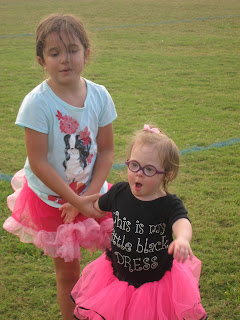I'm sure this is a word you have heard a lot...it's a word that has, I think, really had a pernicious effect on our society. Today, a well-meaning person talked about you taking classes with "normal" children. While she meant nothing by that statement--she just used "normal" instead of "typically developing"--it really made me think about the "norm," and about, how as I tell my students, none of us can ever really conform to it.
Sometimes, the word "normal" can mean "typical"--I remember clearly a film shown to us when I was in fifth grade (in 1983 or so), called "Am I Normal?" Some of my blog readers might remember this attempt at teaching young, pre-pubescent boys that physical developments, like erections and body hair, are, indeed, "normal." In order to figure this out, though, the young boy not only reads sex books but also, at the end of the clip, goes to the zoo and observes animals having sex and, yes, erections. This, more than anything else, convinces him that he's okay...he's "normal."
Sometimes the norm is something we want to exceed. When I was in elementary school, I had an IQ test (which, by the way, I've never done since), and I did not "qualify" for the Talented and Gifted program. So this number, this intelligence quotient, "measures" intelligence and tells us if we are average, above average or, most damaging of all, "below average."
This, I tell my students all of the time, is how we've been conditioned to think, right? And we spend so many of our middle school and high school years trying, with all of our might, to fit in, to be "normal" (as one of my good friends, Meg, said, even being classified as "gifted" can be damaging in that she was never rewarded for working hard and always expected to be more). There is something comforting, safe, about being "normal."
But this entire concept is really not all that old; it stems back to the mid-nineteenth century. In the 1830's, as a result of the Poor Law of 1834, the Factory Act of 1833, and the Reform Act of 1832, people became really interested in statistics: in monitoring others. Were the poor being provided with adequate housing and health care? How many were working for a "living?" How many children were working in factories? Who was being "productive," and who was not?
In order to answer questions like the last one led to the foundation of the London Statistical Society in 1835- the idea was that people could be improved- made more productive- by seeing where they were at. So statisticians used both Gauss's bell curve, from the late eighteenth-century, and Galton's "ogive," which shows the desired trait (like a high IQ), on the right side of the graph:
In many ways, Galton's ogive speaks directly to productivity- the people who fall on the right side can be more productive citizens, but Gauss's curve is still the one we think of when we think of the "norm." The "norm" is in the middle, the people with high IQ's are on the right, and those with lower IQ's are on the left. Again, it's important to remember that this is a mid-nineteenth century way to categorize people so that they could be productive, work in factories, earn money, and be "good" citizens.
Now if I think about the idea of disability, I think about productivity. In fact, when I ask my students to define disability, they talk about the ability to "be a productive citizen." Interesting. So if someone just decides that s/he would rather hang out on the couch and not work, maybe not even take care of oneself, that person would be "disabled?" No, right? This rhetoric breaks down pretty quickly.
It's even more difficult to figure out what a "norm" might be. Other than a "normal" IQ, which can be measured, what is "normal" behavior? Normal appearance? When we think about these questions, we quickly realize that the answer depends upon the time period in which a person lived. So normal behavior, for a woman, in the middle ages would be drastically different than normal behavior today. Appearance-wise, people in the 15th century were considered more attractive if they were overweight, as it meant they were eating more. At the time, this woman would have been considered very attractive:
Now we would say that she is overweight, perhaps, that her ends are split, and a host of other things. And then there are cultural elements. Even if the beauty "norm" (and this extends to men as well, of course, just differently) is questioned, some other "norm" has to be upheld. Caitlyn Jenner, who used to be Bruce Jenner, would not grace magazine covers if she did not fulfill some norm of beauty. And even though I'm thrilled that models with Down Syndrome are now featured in magazines, I wonder if we'd see this woman if she were overweight or had small breasts or if she were wearing less makeup:
I shouldn't be so judgmental, though. At least we now see models with Down Syndrome (and, here, a woman of color), and we're starting to challenge this idea of a cultural "norm," the bell curve on which we are all judged. Just yesterday, you wore orange in honor of Unity Day, an initiative to prevent bullying in schools.
So I think we are getting there, but I wish people would think twice before using that word, "normal." What is normal? Are any of us there? Or, to ask a better question, would we want to be?
Julia, I don't want you to be "normal," to fit in, to blend. I want you to be special, unique, to make a splash, to be memorable. As Laurel Ulritch said, "Well-behaved women seldom make history." I would change that to "normal people." It might be safe, but the norm, the top of that bell curve, is a boring place to be.































